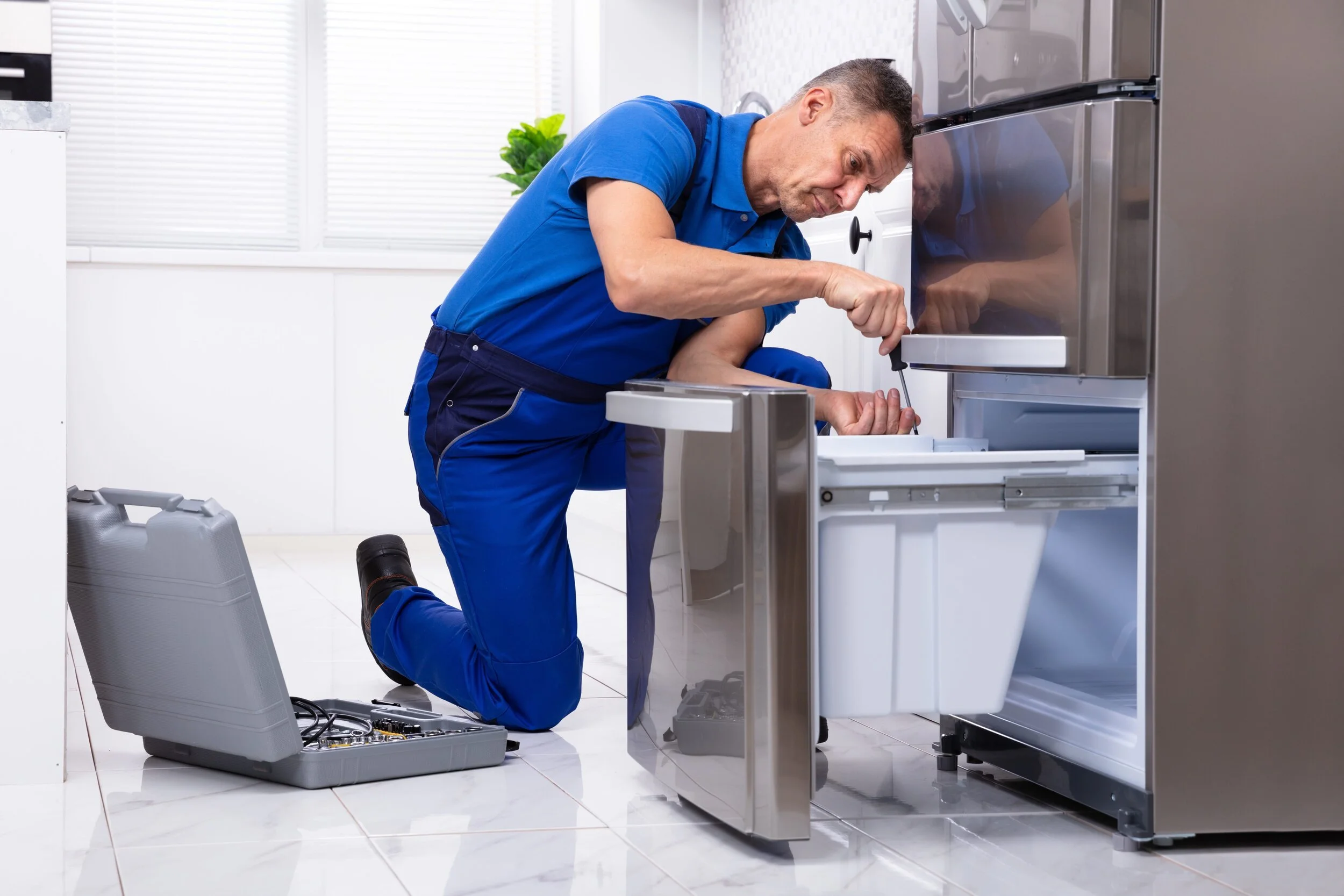You know the sound. Or worse, the silence.
It’s the gurgle-hiss of a dishwasher overflowing onto your brand-new hardwood floors at 9 PM on a Tuesday. It’s the ominous, absolute quiet from a refrigerator that was humming just minutes ago, a silence that screams of hundreds of dollars in groceries about to spoil. Or, most terrifying of all, it’s the faint, sulfur-like scent of gas near your stove that makes the hairs on your arm stand up.
In moments like these, your home suddenly feels fragile. A complex machine that’s just broken a critical gear. And in the sprawling, humid hustle of the Atlanta metro—from Buckhead to Decatur, Alpharetta to East Point—you don’t have the luxury of waiting a week for a repair technician. You need help, and you need it now.
This isn’t about a slightly wobbly spin cycle you can live with. This is about emergency appliance repair Atlanta—a specific, time-sensitive service for when a broken appliance crosses the line from an inconvenience to a genuine threat to your safety, your property, or your wallet.
Let’s break down what truly constitutes an emergency, what you should do in those first critical minutes, and how to find a professional who will actually show up and fix the problem, not just add to your stress.
Table of Contents
- What Makes an Appliance Repair an Actual Emergency?
- The Domino Effect: Why Waiting is a Luxury You Can’t Afford
- Your 5-Step Crisis Protocol: What to Do Before the Technician Arrives
- Choosing Your Cavalry: What to Look for in an Atlanta Emergency Repair Service
- The Great Debate: Emergency Repair vs. Scheduled Service (A Quick Comparison)
- The Real Cost: Is an Emergency Call Worth It? (Spoiler: Usually, Yes
1. What Makes an Appliance Repair an Actual Emergency?
Frankly, most service delays are annoyances, not emergencies. A freezer that’s still keeping things frozen but making a funny noise? Schedule a visit. An oven that takes ten minutes longer to preheat? You can probably wait.
An emergency, in the context of your home’s appliances, is a failure that poses an immediate and escalating risk. If you’re experiencing any of the following, you’re not overreacting by seeking immediate help:
- The Smell of Gas: This is public enemy number one. If you smell that distinctive “rotten egg” odor near your gas stove, dryer, or oven, you have a potential gas leak. This isn’t a “maybe” situation; it’s a “right now” situation.
- Visible Smoke or Sparks: If you see smoke coming from an appliance’s control panel or, heaven forbid, actual sparks, it’s a five-alarm fire hazard. Unplug it immediately if it’s safe to do so.
- Major Water Leaks: A small drip from a water line is one thing. A steady, pooling flow of water from a dishwasher, washing machine, or refrigerator’s ice maker is another. Water is insidious; it wreaks havoc on flooring, subflooring, and can even lead to mold and structural damage in a shockingly short time.
- A Dead Refrigerator/Freezer: When the heart of your kitchen stops, the clock starts ticking. According to the USDA, a fully-stocked refrigerator will rise into the “danger zone” (above 40°F) in about 4 hours if unopened. In Atlanta’s heat, that timeline can shrink. The financial loss from spoiled food alone can often justify the cost of an emergency call.
- Complete Power Loss to a Major Appliance: If an appliance suddenly kills the power to that part of your home (tripping the breaker repeatedly), it indicates a serious electrical fault that needs professional diagnosis.
The common thread here? Immediacy and escalation. The problem won’t get better on its own, and every hour you wait increases the potential for damage or danger.
2. The Domino Effect: Why Waiting is a Luxury You Can’t Afford
Let’s play out a common Atlanta scenario. Your washing machine’s drain hose bursts on a Friday evening. You shut the machine off, place a bucket underneath, and figure you’ll call someone on Monday.
Well, by Monday, that “small leak” has done a number. The laminate flooring is warping. The particle-board subfloor is swelling like a sponge. You’re now looking at not just a $200 repair for the hose, but thousands in water damage restoration, new flooring, and potential mold remediation. That’s a brutal domino effect.
The same goes for a fridge on the fritz. A $150 emergency service call to fix a faulty compressor relay or a clogged coil seems steep until you tally up the $400 worth of organic meat, fresh produce, and groceries now destined for the trash.
The math is almost always in your favor when you act fast. An emergency repair is an investment in damage mitigation.
3. Your 5-Step Crisis Protocol: What to Do Before the Technician Arrives
When disaster strikes, panic is the real enemy. Take a deep breath and run through this checklist. It’ll make you safer and help the technician diagnose the issue faster.
- Cut the Power, Shut Off the Water/Gas: For electrical issues, unplug the appliance or flip the specific circuit breaker at your panel. For water leaks, find the dedicated shut-off valve (usually located behind or beneath the appliance) and turn it clockwise. For a gas smell, turn off the gas shut-off valve located at the appliance—it’s usually a lever-type handle.
- Contain the Mess: Throw down every towel you own on a water leak. Move valuables and furniture out of the way. For a leaking fridge, grab coolers and ice to salvage what food you can.
- Do NOT Be a Hero: I can’t stress this enough. Do not attempt to disassemble the appliance yourself. You could void the warranty, cause further damage, or, in the case of gas or electrical issues, seriously injure yourself. Tinkering is for non-emergencies.
- Gather Intel: Jot down the appliance’s make, model, and serial number. Note exactly what happened. Was there a strange noise? A burning smell? What error codes are flashing? This information is pure gold for the dispatcher and the technician.
- Call a Pro, But Vet Them Quickly: Now you make the call. But don’t just Google “appliance repair near me” and pick the first ad. Which brings us to our next point…
4. Choosing Your Cavalry: What to Look for in an Atlanta Emergency Repair Service
In a crisis, you’re vulnerable. And sadly, some companies prey on that. You need a partner, not a predator. Here’s what separates the true pros from the sharks:
- Transparent, Upfront Pricing: A reputable company will be able to give you a clear idea of their emergency dispatch or diagnostic fee over the phone. Beware of anyone who is vague or says, “We can’t know until we see it.” They should explain their labor rates and parts markup.
- Certified & Insured Technicians: Ask if their technicians are certified (by organizations like NASTeC) and, crucially, if the company is fully insured. This protects you and your property.
- Local Inventory: The best emergency services in Atlanta maintain a well-stocked van with common parts—thermistors, relays, valves, etc. This increases the chance of a same-day, one-visit fix.
- Real, Human Reviews: Look beyond the star rating. Read the reviews on Google and BBB. Do they specifically mention “emergency,” “same-day,” “professional,” and “fair pricing”? That’s a very good sign.
5. The Great Debate: Emergency Repair vs. Scheduled Service
Is there a difference beyond the speed? You bet there is. Here’s a quick, clean breakdown.
| Feature | Emergency Repair | Scheduled Service |
|---|---|---|
| Speed | Same-day or next-day dispatch. | Scheduled days or weeks out. |
| Cost | Higher due to priority scheduling and after-hours rates. | Standard, lower rates. |
| Ideal For | Safety hazards, active leaks, total failures (like a dead fridge). | Minor issues, strange noises, preventive maintenance. |
| Technician | Often a senior, highly-experienced tech skilled in rapid diagnostics. | Could be any available technician on the schedule. |
| Parts Availability | Service vans are typically stocked for common urgent repairs. | Parts may need to be ordered, requiring a second visit. |
The bottom line? If your situation fits the “emergency” criteria we outlined, paying the premium for the immediate service is almost always the more financially sound decision in the long run.
6. The Real Cost: Is an Emergency Call Worth It? (Spoiler: Usually, Yes)
Let’s talk numbers, because that’s where the rubber meets the road. A standard diagnostic fee in Atlanta might be $80-$100. An emergency or after-hours fee could be $150-$250.
Ouch, right? But now, let’s stack that against the cost of not making the call:
- Water Damage: A persistent leak can destroy flooring and drywall. Restoration can easily run into the thousands.
- Food Spoilage: The average American household has $250-$500 of food in their fridge and freezer. In a heatwave, you could lose it all in a matter of hours.
- Safety: Can you even put a price on this? A gas leak or electrical fault could lead to a fire or explosion. The potential cost is infinite.
- Hotel Stays: If a major leak or gas issue makes your home uninhabitable, you’re now paying for a hotel.
When you look at it that way, that emergency dispatch fee starts to look a lot more like an insurance policy.
Conclusion:
At the end of the day, a broken appliance in a panic-inducing moment is about more than just the machine. It’s about the disruption to your life, the threat to your home, and the sheer stress of not knowing what to do.
Finding a reliable, transparent, and fast emergency appliance repair service in Atlanta isn’t just about fixing a washer or a fridge. It’s about restoring your peace of mind. It’s about knowing that when things go wrong—and in the life of any homeowner, they inevitably will—there’s a professional you can call who will treat your emergency like their own.
So, the next time you hear that ominous gurgle or smell that tell-tale gas, you won’t have to panic. You’ll have a plan. And honestly, isn’t that the best repair of all?










